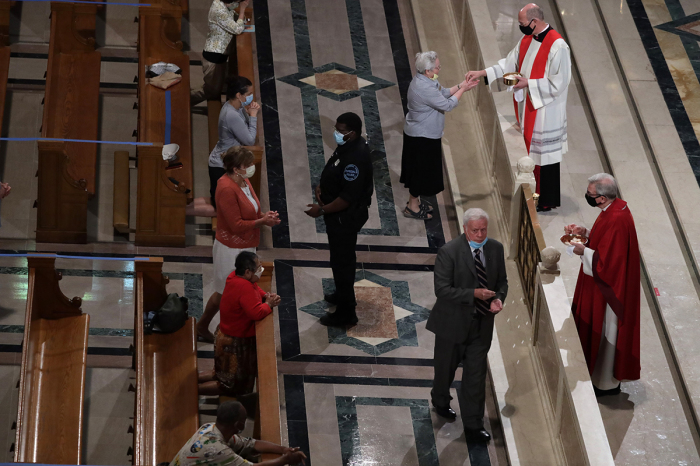Democrat warns Catholic Church it may be stripped of tax-exempt status if politicians denied communion

As U.S. Catholic bishops draft a controversial document on whether priests can deny communion to politicians who support abortion, one House Democrat has implied that the Catholic Church should lose its tax-exempt status if churches institute such a ban.
“If they’re going to politically weaponize religion by ‘rebuking’ Democrats who support women’s reproductive choice, then a ‘rebuke’ of their tax-exempt status may be in order,” wrote Rep. Jared Huffman, D-Calif., in a Twitter post lashing out at Catholic bishops.
Huffman's post came after nearly 60 House Democrats released a “statement of principles to warn the U.S. Conference of Catholic Bishops against what they deem as “weaponizing” the Eucharist.
The statement was released after the USCCB voted Friday to approve the continued drafting of the document “on the meaning of the Eucharist in the life of the Church.”
An overwhelming majority of the bishops (168) voted in favor of proceeding with the draft document, while 55 voted against proceeding. The bishops will continue working on the document, which will be presented to the public at a later date. While the document will provide guidelines for the reception of communion, it will leave “decisions on withholding Communion up to individual bishops.”
In their statement, the Democrats “solemnly urge” the Church “to not move forward and deny this most holy of all sacraments, the source and the summit of the whole work of the gospel over one issue.”
“… We seek the Church’s guidance and assistance but believe also in the primacy of conscience,” it reads. “In recognizing the Church’s role in providing moral leadership, we acknowledge and accept the tension that comes with being in disagreement with the Church in some areas.”
It continues: “We recognize that no political party is perfectly in accord with all aspects of Church doctrine. This fact speaks to the secular nature of American democracy, not the devotion of our democratically elected leaders. Yet we believe we can speak to the fundamental issues that unite us as Catholics and lend our voices to changing the political debate — a debate that often fails to reflect and encompass the depth and complexity of these issues.”
It adds: “We believe the separation of church and state allows for our faith to inform our public duties and best serve our constituents. The Sacrament of Holy Communion is central to the life of practicing Catholics, and the weaponization of the Eucharist to Democratic lawmakers for their support of a woman’s safe and legal access to abortion is contradictory."
The debate over whether pro-abortion Catholic politicians should receive communion has intensified following the election of President Joe Biden, a pro-abortion Catholic who attends mass regularly. As he campaigned for president ahead of the 2020 presidential election, a priest in South Carolina refused to serve Biden communion due to his abortion advocacy.
Last month, more than 60 bishops also wrote a letter to Archbishop Jose Gomez calling for the delay of the debate over whether pro-abortion Catholic politicians should receive communion, citing concerns that implementing a national policy on the matter would pose a threat to the unity of the Church.
Supporters of withholding communion from pro-abortion Catholic politicians, both inside and outside the Church hierarchy, point to the Church’s Code of Canon Law as the justification for their position. The Code of Canon Law states that those who are “obstinately persevering in manifest grave sin are not to be admitted to Holy Communion.”





























